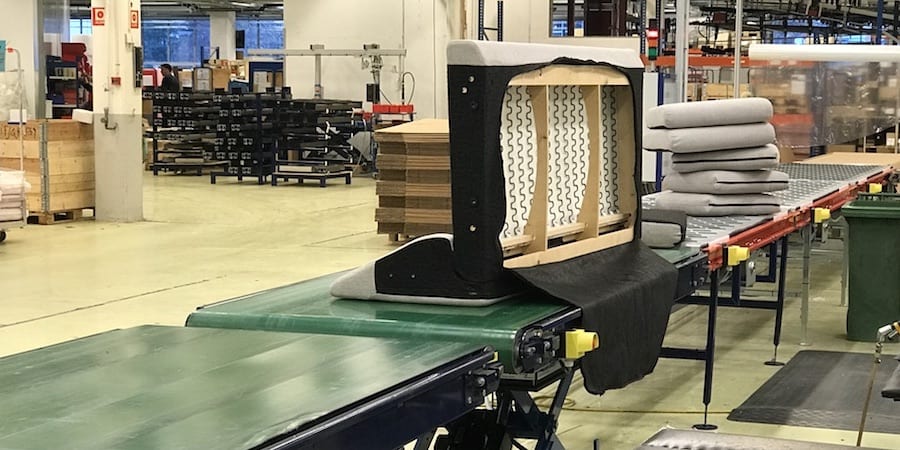
Learning Monozukuri across Boarders
FEATURE – Nordic Door and its Lithuanian partner NDC are applying Lean Thinking and PDCA to develop people, improve quality, and strengthen trust across borders through shared learning.
Words: Eivind Reke
In the picture, from the left: Tor Kjetil Johansson, Anele Ciupliene, Evelina Vaiciukeviciute, and Darius Maminskas
In the south of Norway, in the small and picturesque town of Lyngdal, you’ll find three major manufacturers of wood-based products. A few years ago, I co-authored an article about one of them, Fibo-System. Their neighbor, Nordic Door, is on its own lean transformation journey, led by CEO Tom Refsdal. In 2020, Tom took over a company with a product portfolio that had changed dramatically over the years, from mass-produced standard products to bespoke, specialized doors for hospitals, schools, kindergartens, and hotels. Together with his sensei, he quickly realized that the existing production system couldn’t keep up the pace. So, Tom set out to find and develop leaders interested in transforming themselves and then others through Lean Thinking—from team leaders to plant managers. Now, every leader and team member at Nordic Door is developing their TPS chops by practicing PDCA. Even the IT manager is swearing to PDCA in his digital transformation effort.
In 2024, Nordic Door initiated a research project with SINTEF, funded by the Norwegian Research Council. The goal of the project is to develop people’s skills and knowledge, as well as the digital infrastructure needed to enable zero-defect manufacturing. As Deming taught us, start with quality and everything else will follow. The objective in every department, from sales to shipping, is to find what capabilities are missing, develop them, and realize right-first time at each step of each process. The employees and managers at Nordic Door are now working on a lot of different improvements in-house, build capabilities by problem-solving. However, this ideal is also spreading outside Nordic Door.
Drive 30 minutes outside of Vilnius, Lithuania, and you’ll find Nordic Door Components (NDC), a manufacturer of door frames, wall panels and frameless doors. NDC is a key supplier to Nordic Door and, together, they have embarked on a learning journey to build better quality doors and frames for the Scandinavian market. It’s a smaller company compared to Nordic Door, but its CEO Darius Maminskas is determined to build the business through lean thinking.
NDC has been a key partner to Nordic Door factories and their distribution central for many years. However, their relationship has mostly been transactional. Last year, Tom asked his sensei to support NDC ‘s CEO Darius in NDC’s lean journey, just like he had Tom and Nordic Door in theirs. Developing people who can make excellent, quality products is the name of the game. Soon, NDC discovered a couple of interested and engaged shopfloor leaders in Evelina Vaiciukeviciute, who would take on the role of Internal Quality and Lean Coach, and Anele Ciupliene, the team leader of the Painting and Packing department. During a gemba walk, the sensei and Darius discovered that one of the key issues for NDC stemmed from how the two companies communicated. At the same time, they knew that Nordic Door was suffering from quality issues that obviously originated in the NDC factory. After discussing with Tom and Darius—and nudged by Nordic Door’s Lean Coach Monica Briseid—the two CEOs decided to involve their front-line customer/supplier managers to better understand what difficulties they were facing. Instead of deciding on and developing a new process, they took a lean strategy path and went to find and face their quality issues and, therefore, customer value problems, to frame and form solutions and countermeasures with the people at the gemba.
The frame was clear: let’s make zero defects and let’s make our customers happy. The countermeasures, however, weren’t always as clear. So, the two CEOs decided to create a cross-functional kaizen team consisting of themselves, plus Nordic Door’s Kjell Nodeland (Quality Manager), Monica Briseid (Lean Coach), Tor Kjetil Johansson (Final Assembly Manager), and NDC’s newly found leaders Evelina and Aniela. Together, they invested in several gemba visits to the Lyngdal and Vilnius factories. Soon, they discovered that the gemba is indeed the greatest teacher, finding it especially beneficial to be able to see and touch the product from the point of view of the customer. This made it much easier to find root causes and quickly implement countermeasures.
Since the summer of 2024, the two companies have held visits to each other’s sites every six months. These really help unearth the opportunities for helping each other. For instance, during one visit in Vilnius the team and their sensei got into a deep discussion about the function of the product and thus the parts they make and realized that front-line staff didn’t really have a good idea of it. They just thought of the product as frames and doors. However, understanding more deeply what you are making is a key point in creating what the Japanese would describe as a “monozukuri culture,” one in which people feel passionate about making things. Indeed, Nordic Door and NDC don’t just make doors. They protect people from x-ray radiation, they help guests sleep safely in hotel rooms by keeping the noise out (and protect them from possible fires), they keep kids’ fingers safe in kindergartens, and so on. All these examples refer to product features that are key to the users in their own context, but that can only function properly if manufactured properly—with passion and a clear understanding of the technical processes required.
The teams are no longer discussing general issues, such as “quality not good enough” or “delivery is too late.” Instead, they are talking about technical quality issues and creating ways for operators to check their own work at each key step, to make sure that quality defects are detected as early as possible. They are also discussing what the physical interaction between packing in Vilnius and assembly in Lyngdal should look like—how to pack, what to pack, in what order, how frequently, and so on—coming up with new ideas that aim to make it easier for employees in both companies. Easier to pack, easier to transport, easier to receive, easier to unpack and to pick. This creates a connection between the last process step in Vilnius and the first process step in Lyngdal, resulting in the creation of ever better doors for happier customers.
What is most striking about this story is not the technical countermeasures or the cross-border collaboration, but the way people grow when invited to learn at the gemba. Nordic Door and NDC could have chosen to tighten contracts, add inspections, or automate more parts of the work. Instead, they chose to develop the capabilities of their people. Their leaders practice PDCA and their operators understand the function of the product they make, as a shared language of quality permeates the partnership, from Lyngdal to Vilnius.
This is what Lean truly is—a human development system, rather than a toolbox. It asks us to go and see, to face real problems together, and to learn by doing. Over time, that learning builds more than better doors; it builds confidence, pride of work, and trust across companies and cultures.
As these two organizations continue their journey toward zero defects, the real value may not only be in the flawless doors they aim to produce, but in the craftsmanship and understanding that take root in every person involved. In the end, monozukuri is not just about making things well—it’s also about making better people while making better things.
Want to learn more about and from Nordic Doors? Don't miss the upcoming Lean Global Connection 2025. Eivind will run a session on how the company has been developing leaders by leveraging TPS, while Monica Briseid and Rolleif Charman will dive deeper into how the team is boosting technical, leadership, improvement, and digital competencies. Register for free here.

THE AUTHOR

Read more


FEATURE – The benefits of establishing a lean operating system will support the growth and success of a business in the long term, says Karen Gaudet looking back at her experience at Starbucks.


FEATURE – In this new series, the author taps into LEI Hungary’s experience with lean transformations to highlight the most common mistakes people make when approaching the A3 framework.


FEATURE – Why is lean change so hard to achieve in times of plenty? And why does it seem to be more attainable when chaos reigns? The author tries to answer these questions.


INTERVIEW – Last month we caught up with Toyota veteran Art Smalley in Las Vegas and discussed with him the role of leadership in a lean transformation and the four different types of problem solving he talks about in his new book.
Read more


FEATURE – Lean book clubs as a way to boost learning and collaboration. A Norwegian firm that has been using them for a decade gives us a few tips on how to make them successful.


CASE STUDY – Thousands of kaizens, a relentless focus on learning and the determination to continuously improve have made of this Norwegian company something of a lean fairytale.


FEATURE – Sometimes all you need to change minds is a successful experiment. This is how a Norwegian furniture manufacturer managed to transform the way it thinks about its sofa production.


FEATURE – This article explores the concept of “value network”, emphasizing the importance of looking at lead-times and value creation in a more holistic way.

